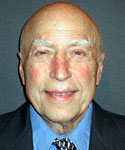Children’s Hospital study probes high breast cancer mortality in black women
Are African American women 1.5 to 2.2 times more likely than white women to die from breast cancer, despite their lower incidence of the disease, because they have less access to medical care? Maybe not, according to a new analysis that will appear in an upcoming issue of the International Journal of Surgery.
In a paper now available online, researchers propose that the excess mortality occurs partly because black women are more likely than white women to develop breast cancer before menopause, when surgery to remove the tumor may pose a higher risk of stimulating cancer growth.
The researchers, led by Dr. Michael Retsky of the Vascular Biology Program at Children’s Hospital Boston, note that African American women are diagnosed with breast cancer at an average age of 46, versus 57 for white women, and that their excess mortality first appeared in the mid-1970s, just when mammography for early detection was introduced. Early breast cancer detection leads to earlier surgical removals, which may actually spur relapse in some premenopausal cancer patients, the researchers say.
“Looking at what’s happening in African American women provides a research opportunity to learn how to better screen for and treat premenopausal breast cancer overall,” said Retsky.
The research extends an earlier analysis published in 2005, which suggested that undergoing surgery before menopause may actually encourage early metastasis and relapse. That paper analyzed data from 1,173 women in Italy who had breast cancer surgery, and found that, among those with lymph node-positive cancer, 20 percent of premenopausal women relapsed within 10 months after surgery — double the relapse rate in women diagnosed after menopause. The researchers suggested that these early relapses help explain the “mammography paradox” — the puzzling observation that mammography screening in women aged 40 to 49 has significantly less benefit than in women aged 50 to 59.
The 2005 paper sparked a flurry of correspondence that led to the new analysis. One letter noted a commonly held belief in the African American community that “exposing a cancer to air” will cause it to spread, an idea often dismissed as superstition. Another letter, from Nigerian physician Isaac Gukas, M.D., Ph.D., observed that over 70 percent of the breast cancer patients he saw in Africa were under age 45, and that they had a poor survival rate, often rapidly deteriorating after surgery. According to Gukas, it is common in Africa for women to seek alternative care before eventually presenting to a physician with locally advanced disease, for fear that treatment will “provoke” the cancer.
“These letters were compelling and impossible to ignore,” said Retsky. “There may be some scientific basis for these folk sayings. We were unaware there was a racial difference in age of breast cancer diagnosis, and it has led us in a major new research direction.” Gukas, now at the University of East Anglia in Norwich, U.K., is a co-author on the current paper.
The researchers do not recommend any changes in screening or treatment protocols for breast cancer, feeling that more research is needed. They propose a number of ways to test their hypothesis:
• By comparing blood vessel growth in primary versus recurrent tumors from black and white premenopausal and postmenopausal women;
• By measuring angiogenesis inhibitors and promoters, before and after surgery, in premenopausal versus postmenopausal women and in black versus white women, and comparing these findings to cancer recurrence;
• By conducting comparative genetic studies in black and white women to determine possible differences in activity of the genes that control angiogenesis.
“We do not have enough evidence to alter treatment schedules as of now,” Gukas cautioned. “However, if additional studies confirm our hypothesis, we may need to give these premenopausal women appropriate chemotherapy, including angiogenesis inhibitors, before surgery to ensure the best outcome.”
|
| The research led by Dr. Michael Retsky of Children’s Hospital Boston may help doctors understand why black women are more likely to die from breast cancer than white women. (Photo courtesy of Children’s Hospital Boston) |
| Children’s Hospital Boston is home to the world’s largest research enterprise based at a pediatric medical center, where its discoveries have benefited both children and adults since 1869. More than 500 scientists, including eight members of the National Academy of Sciences, 11 members of the Institute of Medicine and 10 members of the Howard Hughes Medical Institute comprise Children’s research community. Founded as a 20-bed hospital for children, Children’s Hospital Boston today is a 347-bed comprehensive center for pediatric and adolescent health care grounded in the values of excellence in patient care and sensitivity to the complex needs and diversity of children and families. Children’s also is the primary pediatric teaching affiliate of Harvard Medical School. For more information about the hospital and its research visit: www.childrenshospital.org/newsroom. |
|
|


